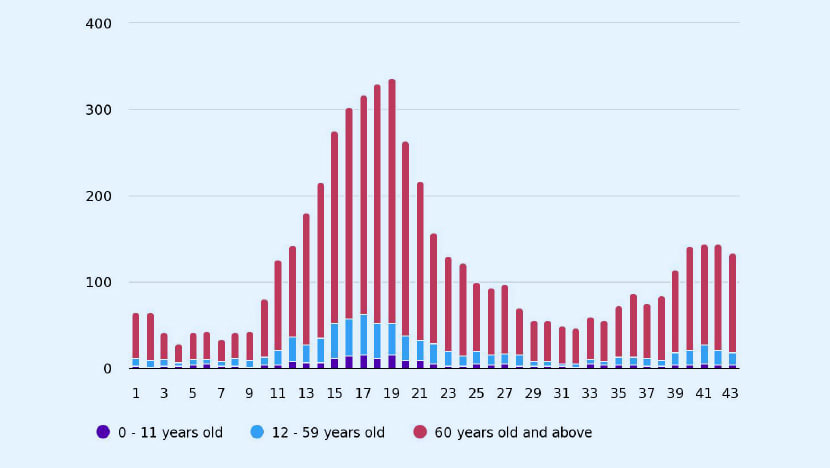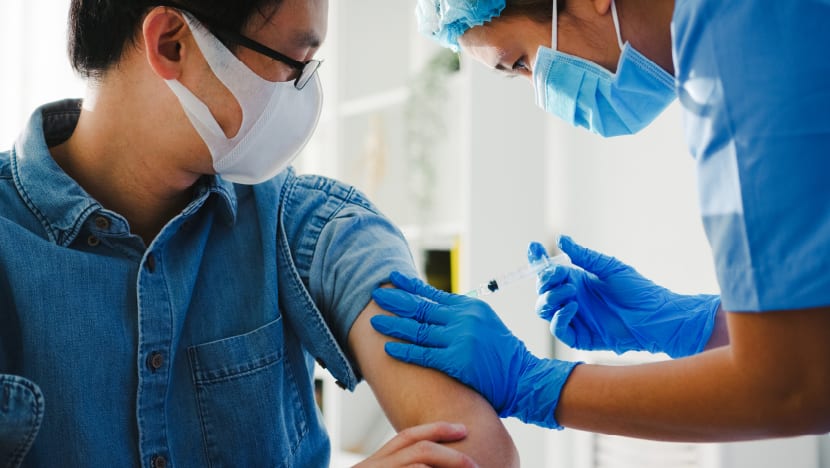Since 2020, COVID-19 has cast a shadow over families worldwide. Terms such as “spike proteins”, “mutations” and “variants” have entered everyday vocabulary. A recent concern is the Pirola variant, with a mutation count higher than previous Omicron subvariants. Designated a “variant under monitoring” by the World Health Organization, it reminds us of the vital role that vaccines play in preventing severe illness and curtailing the emergence of new variants.
At the moment, Singapore is experiencing another wave of COVID-19 driven by the EG.5 and HK.3 XBB Omicron subvariants. As a result, the daily average of COVID-19 hospitalisations has risen in recent weeks.
Although COVID-19 is no longer deemed a public health emergency, these new variants remain a concern for many families. So, as life returns to pre-pandemic norms, maintaining good habits and keeping up to date with vaccinations become crucial for a stronger, more resilient Singapore.

REMEMBERING A CHALLENGING PERIOD FOR FAMILIES
The ramifications of COVID-19, despite its downgraded emergency status, still resonate deeply with families.
Ms Christine Chong, a 37-year-old financial broker, recalled the strain caused by school closures and the shift to remote learning for her daughter, now 12.
“Before, students just checked their paper homework,” she said. “During the pandemic, they juggled emails and multiple mobile apps to ensure that they did not miss any announcements and updates from their teachers. My daughter also missed having her piano lessons.”
Mr Mohamed Ashraf, 45, a director in the education industry, faced a different set of challenges during Singapore’s circuit breaker: Keeping his six children indoors.
The situation worsened when his wife contracted COVID-19 after childbirth, leading to a month-and-a-half of isolation while caring for four of their children who also contracted the virus. “It was a difficult time as I was the only one handling our newborn, who was fed formula milk,” he recalled. “The other kids missed their friends from their soccer team and dance group. While video conferencing helped, they still preferred meeting in person.”

According to a UNICEF study that surveyed more than 130,000 children in 22 countries, the pandemic adversely affected the mental health of youngsters worldwide. Many experienced heightened stress levels, difficulties in focusing, and disruptions to regular exercise and sleep.
Further research points to delays in the development of language and numeracy skills among children aged between four and five. In Singapore, those born during the pandemic are increasingly seeking hospital-based child development support for issues such as speech delays and shortened attention spans, according to a report in The Straits Times.
Ms Chong emphasised the pivotal role of parents and caregivers during that period. “They played a crucial role in helping the children navigate the challenging times by providing emotional support and maintaining open communication,” she said.
Dr Leong Hoe Nam explains to children the importance of keeping up to date on COVID-19 vaccinations, which plays a key role in protecting families and communities.
COMPLICATIONS OF COVID-19 REMAIN
Beyond the upheaval to families’ daily routines, COVID-19 infections continue to carry medical risks such as long COVID and other complications.
Dr Leong Hoe Nam, an infectious disease specialist at Mount Elizabeth Novena Hospital, noted that long COVID can still affect anyone. Estimates suggest it occurs in more than 10 per cent of COVID-19 cases.
“Every infection carries the risk of long COVID and the same complications,” he said. “You might be fine with the first infection but develop long COVID with a subsequent one.”
Individuals with long COVID may experience a wide range of symptoms that can persist for weeks, months or even years after the initial infection. Furthermore, these symptoms can sometimes reappear after subsiding.
A recent study by Nanyang Technological University found that unvaccinated individuals who recovered from COVID-19 were 56 per cent more likely to experience new heart complications a year after being infected.
WHAT IS LONG COVID?
Also known as the post-COVID condition, long COVID refers to symptoms that persist for months after the initial infection, affecting individuals’ physical, social and mental well-being.
In children, symptoms may include anxiety, chest tightness, difficulty breathing, impaired focusing or thinking, intolerance to exercise and – on occasion – weight loss due to an inability to taste or smell.
KK Women’s and Children’s Hospital is currently studying long COVID in children and teenagers in Singapore to ascertain its prevalence and associated risk factors. A key identified risk factor is a lack of vaccination: According to medical experts, evidence suggests that vaccination can halve the risk of developing long COVID.

PROTECT YOUR FAMILY: GET UP-TO-DATE VACCINATION
The risk of new variants emerging remains as the virus adapts to our immune system’s defences, said Dr Leong. Thus, getting vaccinated and boosted is our best defence against COVID-19. It also protects those around us since vaccinations can reduce the risk of transmission, he advised.
Furthermore, being protected against COVID-19 ensures that we can live our lives to the fullest by not missing out on important events such as school examinations, work presentations, family gatherings and travel, due to illness.
Families should remain vigilant and continue to do their part. Mr Ashraf and Ms Chong, along with their families, have received their recommended vaccinations and boosters, except for Mr Ashraf’s four youngest children.

Ms Chong noted the vaccines’ efficacy. “They give us protection against serious illness,” she said. “Parents getting boosted with updated COVID-19 vaccines not only protect their children and elderly grandparents, but also reduce disease transmission, create herd immunity and safeguard those who are unable to be vaccinated.”
While adult vaccination and getting boosted are not mandatory in Singapore, Dr Leong said that it is crucial to receive booster doses when recommended because we are still understanding COVID-19 and its effects.
THE BASICS OF GETTING BOOSTED
The latest COVID-19 vaccine, targeting the XBB variant, is now approved for individuals as young as six months in Singapore. The Ministry of Health’s latest COVID-19 vaccine guidelines encourage everyone aged six months and older to get the updated vaccine, particularly healthcare workers and those caring for medically vulnerable individuals.
The vaccine should be administered one year after their last dose but not before five months have elapsed. This is in addition to previous advice for those over 60, aged care residents, and individuals with underlying health conditions to receive the vaccine.
To get a booster, you can walk into any polyclinic or one of the nine Joint Testing & Vaccination Centres (JTVCs) located across the island. Alternatively, you can book an appointment at a JTVC or another participating clinic here.
The COVID-19 vaccine is free for Singapore citizens, permanent residents and long-term pass holders aged six months and above.
Beyond vaccination, Dr Leong emphasised the effectiveness of wearing masks in countering COVID-19 infections. Masks have proven to reduce a wearer’s exposure to and the transmission of COVID-19 by limiting the amount of infectious particles that are inhaled or exhaled. This precaution is especially crucial for the immunocompromised. Dr Leong advised that those wishing to avoid infection maintain the practice of mask-wearing in crowded areas.

As the virus evolves, doctors predict a decrease in population immunity. Over time, vaccines gradually lose effectiveness against mild to moderate infections. Adopting updated COVID-19 vaccines or boosters is key to restoring widespread immunity and limiting the spread of new variants, thus protecting the most susceptible individuals.
For Mr Ashraf, the importance of staying vaccinated and boosted against COVID-19 is clear. “We need to be strong and healthy to care for our families and ensure their safety,” he said. “Being parents, our daily activities expose us to a potentially higher number of infected people. So, it is necessary to keep up to date with our vaccinations to strengthen our immunity against the virus.”
This article is sponsored by Pfizer Singapore. The opinions expressed in this article are solely attributable to the expert(s)/speaker(s)/participant(s) appearing in therein. This material is intended for educational/disease awareness purpose only and is not intended to replace consultation with the healthcare professional. For any further information, please consult your healthcare professional.
References available upon request.




